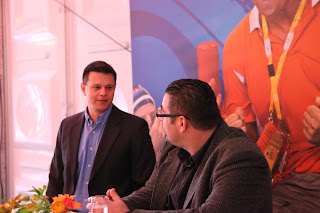http://www.sportresult.com/sports/waterpolo/ECH2012/res.asp?layout=
Hoy empieza la Competición femenina. Los hombres descansan tras dos Jornadas de Competición. Una derrota ante Serbia y una victoria ante Rumania.
Yo actuaré como arbitro neutral de juez de gol en el partido que enfrentará a las locales con Rusia.
Como ya es habitual en otros Ctos. de Europa , mañana , nos reuniremos los árbitros a las 10,30 h para recibir indicaciones técnicas y analizar técnicamente como se han ido desarrollando los partidos en las 2 primeras jornadas de Competición.
En este meeting hemos tratado esencialmente los puntos que contempla el documento de la WWPRA que podeis consultar en :
http://www.wwpra.org/Instructions.html
y que es el siguiente :
INSTRUCTIONS
WORLD CHAMPIONSHIPS SHANGHAI 2011 &
FINAL WORLD LEAGUE FLORENCE 2011
“WATER POLO SHOULD BE A FASTER, MORE INTELEGENT AND LESS VIOLENT GAME”
WASTING TIME
Even if the rule of wasting time doesn’t exist anymore, it is not in the spirit of the game that players be allowed in last minute(s) to hold the ball and refuse to play. The public and the media cannot understand why this is allowed … in every team sport the last minutes are the most interesting of the whole game. Therefore the following instruction is to protect the game:
A player in possession of the ball MUST move (swim).
Even it is not forbidden to pass the ball to goalkeeper, he must be active and must move with the ball – i.e. they cannot stay stationery. If the instruction is not respected by the player in possession, then the referee shall declare a change of possession of the ball.
PRESSING
We must prevent a violent game such as when everyone is holding everyone. We therefore MUST strictly respect the following rule:
To hold or sink the attacking player to prevent movement with two hands, is an exclusion foul.
Restricting the movement by holding is not allowed, and must be punished with exclusion foul.
Restricting the movement by holding is not allowed, and must be punished with exclusion foul.
Pressing is an allowed tactic of the team, but it must not be used for killing any action. When a team starts to play pressing, the referee must give his full attention to the committed fouls. Exclusion fouls cannot be replaced with an ordinary foul. By calling an exclusion foul for this offence on the perimeter, we can return the game back to the intended spirit of the game and the rules. The referee must protect the action and movement of players.
CENTER – DEFENDER
The referee must avoid whistling immediately exclusions fouls Every exclusion must be seen clearly. If an exclusion foul is a result of a prior contra-foul, the referee must react immediately and declare a contra-foul. We must whistle the first foul and not the reaction to that first foul. It is not allowed for the attacker to play under water, to push his/her head into defender, and playing without knowing where the ball is. Any foul which affects the game, must be declared. It doesn’t matter where the ball is. Whilst a struggle for position is allowed the players must not be holding, sinking or jumping over the head. The referee must clearly see the intention of the player, for the ball, when attempting to score a goal.
Observation of the head (face) of the attacker, can be a big help in this situation. A player who’s chin is down, trying to get a ball, is probably being pulled back. A player who’s chin is up and clearly is not showing any intention to get a ball is simulating or committing a contra-foul.
BEHAVIOUR OF THE BENCHES
The coach is responsible for the behavior of the bench. Everybody on the bench, except the coach, must sit on the bench. No one is allowed to pass instructions to the team while the coach is present on the bench. Only the coach has this privilege. When there is miss-behavior on the bench, the coach should be first warned by the referee. If the miss-behavior continues, a yellow card should be shown to the coach. If the coach is excluded, the assistant coach will receive the benefit to pass instructions to the team and calling time-outs- but he cannot move up to five meter line. When the assistant coach is in charge he is responsible for the behavior of the bench. If a referee sees a player on the bench, protesting, commentating on referees decisions, standing or commiting any other kind of miss-behavior, the player must be shown the red card immediately. Players excluded for exclusion without or with substitution must leave the bench immediately. A player excluded with three personal fouls, must remain on the bench with his cap on.
Doctors and physiotherapists
Many teams are using beside three officials on the bench, also doctors or physiotherapists. On the bench there are only three official persons allowed! Behind the bench, outside of lines of field of play, we can allow two chairs for doctors. They are not allowed to come to the bench, or near field of play, for passing instructions or giving the water to the players, anytime during the game. Doctors can approach to the field of play ONLY in case of injury or with referees permit. Doctors not respecting this instruction will be removed from field of play.
Doctors and physiotherapists
Many teams are using beside three officials on the bench, also doctors or physiotherapists. On the bench there are only three official persons allowed! Behind the bench, outside of lines of field of play, we can allow two chairs for doctors. They are not allowed to come to the bench, or near field of play, for passing instructions or giving the water to the players, anytime during the game. Doctors can approach to the field of play ONLY in case of injury or with referees permit. Doctors not respecting this instruction will be removed from field of play.
TWO HANDS FOUL
Blocking or only intent to block, prevent pass or shot, is an exclusion foul, or penalty, when commited inside 5. meters line. Referees must put more intention in this foul. Many players are using two hands “as showing to the referee that he is not holding opposite player”. If attacking player have a ball in the hand, we cannot accept this kind of foul from defending player.
TECHNICAL MISTAKES
All technical mistakes (jury table, time-outs, 30 seconds attack) that occur can be and must be corrected. A referee cannot allow a technical mistake to have an affect on the game or result. The most common mistake is when a player is excluded for 20 seconds. The attacking team scores a goal but the defending coach protests about 20 seconds exclusion – i.e. the coach complains that player didn’t get the signal from the jury table to re-enter the field although the 20 seconds had elapsed. The referee must stop the game, take the ball out of the water and first discipline the coach and bench. After that, the referee should check with the secretary regarding the correct time of the exclusion. The delegate should help in resolving situation. If the jury table made a mistake – i.e. did not give the signal to the player after the 20 seconds expired - then the referee shall return the time on the clock to the moment when the 20 seconds has elapsed, let the excluded player back to the game, cancel the goal, and continue with the attack for attacking team with 10 seconds remaining on the shot clock.
Más tarde tendremos una comida informal en la piscina , en la zona del Hospitality con todos lo árbitros y los delegados.
Por la noche, os colgaré información del partido de nuestra selección nacional ante las germanas en un post a parte con un montón de fotos... clikar en : http://arbitroswp.blogspot.com/2012/01/esp-22-12-ger-women-eindhoven-2012.html
Aqui teneis más fotos de la Jornada :
Todos los resultados en :
http://www.sportresult.com/sports/waterpolo/ECH2012/res.asp?layout=
Hoy juega el Barça !!!! ...así que iremos a vr si lo ponen en un algún bar..al fin y al cabo estamos en el país de Neskens i Cruiff !!!
Mañana os cuento , a ver que nos deparan la designaciones































No hay comentarios:
Publicar un comentario